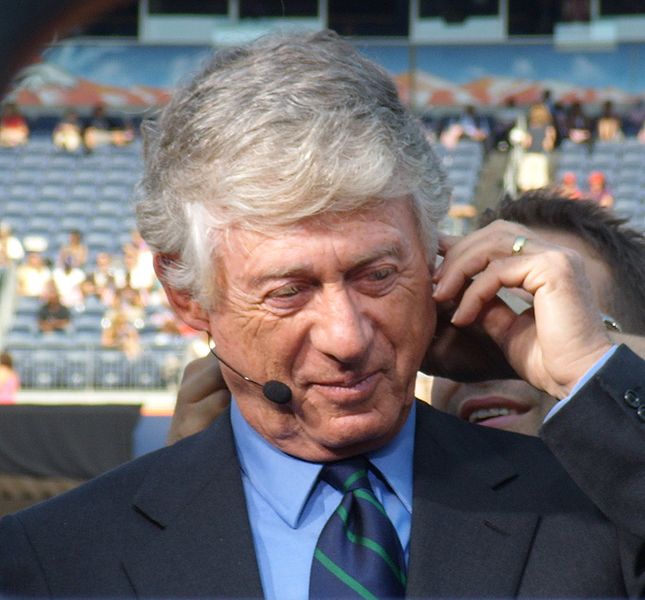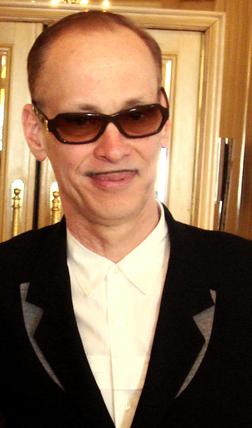How To Act Around Famous People
Ted Koppel, the former host of ABC’s Nightline, was a fixture on my family’s living room television when I was growing up. I watched his show several times each week, and had an enormous amount of respect for his approach to journalism.
So when I started my job as a production coordinator for Nightline in 1997, I was petrified to meet him. When he approached me for the first time, I shook his hand and told him how honored I felt to work for him. I could barely get the words out. At the end of our brief exchange, I took a step forward, caught my foot on a file cabinet, and fell to my hands. I was mortified.
Today’s post will address a public speaking challenge few coaches ever discuss: how to act around famous people.
If you’ve ever watched someone who is in the presence of a celebrity, you may have observed the awkward, often stuttering exchange that often occurs. It’s uncomfortable to watch. Perhaps it’s happened to you, too.
Fortunately, I’ve learned a few things along the way—which is a good thing, since my occupation frequently has me working with high-profile public figures.
The most important lesson I ever received came from Ted Koppel’s personal assistant, a man who gave people flack for sport. When we walked into ABC’s green room together one night to greet guest John Waters (the film director best known for Hairspray), I was shocked to see him tease Waters. When we walked out of the green room and I told Koppel’s assistant that I couldn’t believe he said that to Waters, he replied with wisdom I’ve never forgotten: Since celebrities are used to having sycophants around them all the time, he said, they appreciate people who treat them like they’d treat everyone else.
That’s not to say that you have to give public figures grief—but the more “normal” you can keep the exchange, the more comfortable it will be for everyone involved. If you admire a specific project they’ve worked on, it’s okay to acknowledge that. I recently told a singer-songwriter how much one of his songs helped me during a difficult period in my life. But I quickly moved on and didn’t come close to crossing the line between admiration and idol worship.
When I’m around a public figure these days, I don’t spend a lot of time fawning over their celebrity status. After offering a quick compliment related to something about their work I admire, I quickly move on to deal with the business at hand, joke with them like I would any other client, and deliver the direct advice that other people hesitate to deliver.
So remember this advice the next time you work for or collaborate with a celebrity: Keep it cool. Act normal. And instead of pretending that you feel perfectly at ease, focus on trying to put them at ease, instead.
Have you worked with public figures or celebrities? If so, how have you managed your interactions with them? Please leave your experiences in the comments section below.
John Waters Photo Credit: Wikimedia Commons, Mr Azed





My college gave Peter Jennings our annual journalism award back in 1984. When he first arrived at the awards luncheon at the Plaza Hotel, we all stood around him in awe, saying very little. I heard myself try to break the awkwardness, telling him we still had some time-slots available at the campus radio station if he ever wanted to try radio.
Luckily, he laughed immediately and launched into a story about how much he enjoyed his short time in radio. “It’s a fascinating medium.”
At the end of the luncheon, he told me to look him up next time I was in New York.
I did. I watched him anchor the news several months later. He even looked at an air-check of mine the following year.
Nearly twenty years later in 2002, he came to Richmond, Virginia, where I was the main anchor. I showed him a picture of us from decades earlier. He looked and it and laughed about how bad we both looked.
None of this would have happened if I hadn’t unwittingly used Brad’s advice and spoken to him like he was “just another person.”
Thank you.
Hi Ray,
What a wonderful anecdote – thank you for sharing it! Perhaps Peter recognized something of himself in your pluck and rewarded you for it.
Your comment also makes me wonder if it’s a good idea to have a “conversation starter phrase” in your back pocket just in case all goes silent at the moment one meets a celebrity? On one hand, it’s a bit canned, which goes against the advice of this article. On the other hand, it may just be the ember that ignites a larger flame of conversation.
Thanks for reading and sharing. As a former ABC Newser, I really enjoyed that story.
Best wishes,
Brad
For a canned phrase, how about “What are you reading?” It works as an icebreaker for everyone six years old and up – why not celebrities?
Hi Briana,
Thanks for commenting!
I’d like to offer a slight modification/personalization to your phrase, to help make sure it doesn’t come across as random: “I remember reading a while back that you were reading ‘The Help.’ Have you read anything else recently worth recommending?”
Thanks again, and take care,
Brad
I agree treating celebrities as one would considerately treat all others is best. At times, it might mean recognizing a person does not wish to engage, is tired, hungry, thirsty, etc., and granting needed space. I once hosted a very famous world figure at events over a three-day period, a person who had a natural tendency for grumpiness and some physical challenges owing to the long-term effects of mountain climbing. He traveled with an extremely gracious companion who smoothed the path and served as a warm and helpful buffer. I was deeply impressed by both individuals, but remember the companion most warmly.
I’ve always just done this, sort of by accident, and what you say is very true.
I have just naturally been blessed/cursed with a tendency to view and treat everyone the same, so whenever I’ve met well-known people, I’ve been able to really hit it off with them and get into interesting conversations and have these relaxed, casual moments with them. As a consequence, when they start to feel uncomfortable with the way they are being treated by others in the room they will sometimes seek me out as a means of escaping that treatment.
People are often amazed by this and think there’s some special quality or superpower I have, but it’s really simple – I treat them as regular human beings. No one enjoys being singled out and treated like a freak, even if they’re singled out in a “good way”. Pretty universally, people just want to be accepted and respected, and make simple human connections.
Many years ago, my brother was asst.manager at the Hooters in Clearwater, FL. Motley Crue was playing locally and singer Vince Neil came in, as many “rock stars”, athletes and celebs often did. We grew up listening to Crue so it was kinda a big deal for my brother to say “hi”. However, he left it at that and had a beer wIth Vince, talking about what was on tv and everything else but his music. Vince actually thanked him for having a beer with him like a normal person in a bar and wound up coming back after checking in to his hotel to have a few more beers with my brother. I wound up getting an autographed Hooters menu when their discussion turned to family. They are just people who happen to have publicized accomplishments.
Great story, Rob, thank you for sharing it!
While I thought working with Ted Koppel was rather cool, it’s not quite the same as meeting an actual rock star. 🙂
Be well,
Brad